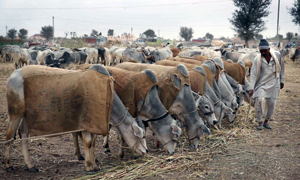Osmanabad: Over the last six months, Laxman Ritapure lost ten of his cattle. Four cows, four bullocks and two calves. As Marathwada's searing drought lengthened into a second year, he ran out of water and fodder to feed them.
In this parched eight-district region where the drought has affected every single village, the beef ban which was enacted a year ago has come as a double whammy for farmers like Ritapure.
The new law extended Maharashtra's ban on cow slaughter to include bullocks. This cut off demand from abattoirs and paralysed trade at cattle markets. Soon, there was a steep price crash. "I took them to the cattle market last year but prices had halved. I tried to sell them again in January but there were no takers," says Ritapure.
He still 26 cattle left to feed. With just one acre to his name, Ritapure had bought ten animals seven years ago. The brood grew over the years. Ritapure now spends Rs 2,000 a week on fodder. The money he earns from selling milk just about covers this.
"If the government banned beef to save cows, it should look after them too," he says bitterly. Having raised the animals himself, losing them is particularly painful. "They are like my children. I would rather go without food myself than see them die," he says.
His neighbours have also lost their cattle in the last few months. Melon farmer Kiran Kale has lost one of his seven cattle. Suryakant Konde has lost a cow and a calf. "During the day, I just release my buffalo and calves. They graze on what they can find," says Konde, who has a three-acre field. The government is helping to fund 333 cattle camps set up in the region by private groups and NGOs, where water and fodder is given free.
As many as 3.2 lakh cattle in Marathwada are housed in the camps located in the worst-affected districts of Beed, Latur and Osmanabad.
For farmers desperate to save their livestock, the cattle camps are a life-line. But Mangrul's villagers say the nearest camp is five km away and difficult for them to access.
Farmers have to stay at the camp to look after their animals. But most camps don't provide bathing facilities or food for these care-takers. "I will have to travel home every day. Who can afford to spend Rs 50 a day on transport?" asks Ritapure.
"We do not run the camps," says Osmanabad collector Prashant Narnaware. "We approve applications from individuals or NGOs. We give them Rs 70 per animal per day from the National Disaster Relief Fund."
The majority of cattle camps are run by local politicians, including many who plan to stand for the zilla parishad elections next year.
The BJP's Santosh Hange, a member of the Beed zilla parishad and an aide of rural development minister Pankaja Munde runs a cattle camp at Nandurghat in Kaij Taluka. Hange plans to stand for the zilla parishad polls and is acutely aware that the camp will endear him to his electorate. "I am helping them during a crisis. They will remember me," he points out.
In camps that provide food and water for the farmers tending to cattle, entire families have moved in.
"There is more water for us here than in our own village," says dairy farmer Bharat Baglani who has been living at Shiv Sangram politician Rajendra Mhaske's cattle camp in Beed for the last eight months.





Comments
Better to trade all these cow to baba pathanjali , he can utilize for his low standard items like milk , butter & ghee etc etc
Dear Anthony,
U wrote everything right... But the last sentence on God...
ISLAM says ALLAH is the creator of all that exists.. & He knows whatever happening in this earth.. He is the most MERCIFUL.. cos of his mercy, Some of his creation do the evil and get away... But there is DAY it will accounted. That is the day, We will have to answer everything for the DEEDS done in this world which is the creation of ALLAH.
Suffering will exists in this world and those who oppressor people with their evil power will have permanent punishment unless they REPENT sincerely.. ALLAH forgives every sin except associating partners with HIM in WORSHIP.
God will SAve this COUNTRY for sure from the EVIL which we people CREATED cos people just believe what is said to them in the media....and elect leaders who doenst make sense...
When we look into who is ALLAH the true God, ALLAH's help comes even if you are in the deepest of the ocean calling him to help.
First Know who is ALLAH. When U know who is ALLAH surely U will depend on ALLAH and then the fear of such pity evil leaders will VAnish ... from your Fearful hearts that has been oppressed by these evil leaders.
Prakash..there are lot of genuine problems where wordings can bec twisted leave it...how can you save your Mata or how gods could die of thirst and hunger chodh yaar....ask you Hindu god saviors to stop this bulshit and stop seeing beef eaters.....as said in pk movie...sabh wrong number hai. just to screw minorities..
Sue your bjp rulers who can't save your God.
RSS and Bajrangies should provide proper basic water and food supplies to these innocent animals.....it is solely those cow protectors responsibility to take care of them....they talk too much about cow now let they solve this problems too...
Add new comment